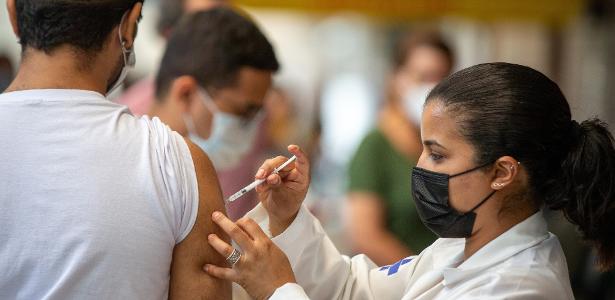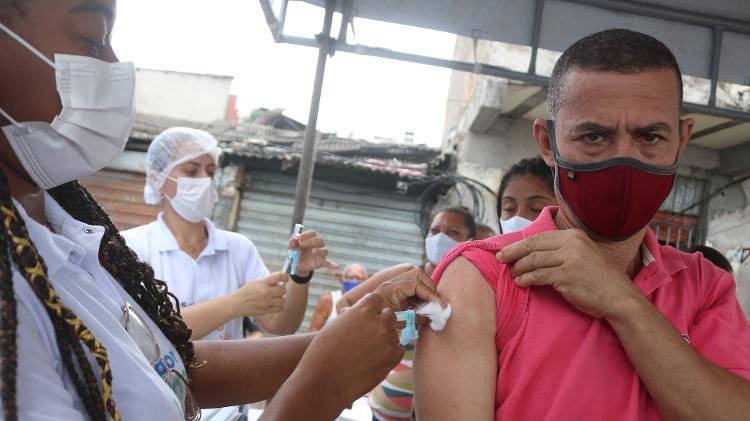little more than after one year With the start of immunization against COVID-19, Brazil has difficulty obtaining data on the efficacy of vaccines. The Ministry of Health responsible for the data in the country has not yet published any study related to vaccination, hospitalization, and deaths from the disease.
According to experts in the region, in addition to not showing “interest” in measuring this effectiveness, the data management model used by the ministry makes it difficult for projects to conduct this survey.
the UOL Talk to some of the principal investigators about the country’s covid-19 data projects. Experts report that the difficulty is caused by a technological problem in getting to the percentages of people who are hospitalized or who have died with full, delayed or even unvaccinated vaccination – and break that down into age groups, for example.
They claim that the biggest problem is that the country has two separate data systems that are different and do not communicate with each other: the vaccination system (SI-PNI, National Immunization Program Information System) and the hospitalization and mortality information system. (Sepip-painEpidemiological surveillance system pain).
According to Isaac Schrarstzhaupt, Coordinator at the Covid-19 Analysis Network, an effective nationwide survey can only be done by crossing data from the SI-PNI with that from Sivep-pain. But this is not possible because the two public systems generate different (anonymous) identities in each database.
“When they anonymized the SI-PNI, they created a patient ID. When they masked the identity of Sivep, they created another ID. So it is impossible to get information on hospitalization or death in Sivep and go to SI-PNI to see when and how many doses he took the person “.
Without an identifier (an abbreviation that comes from an abbreviation of the word identification) To make this crossing, it is necessary to have access to the so-called closed data, which collect personal information from patients and vaccinated people. This, to ensure privacy, has a very restricted access.
In this case, states and municipalities have access to these closed databases and can perform this local transit using data such as name and date of birth. But there’s going to be a lot of work to do, and a few of those that will end up doing it.”
Isaac Scharszhaupt, COVID-19 Analysis Network
Non-integration requires more effort
Even for those with access to full data, such as federal research centers, cross-referencing information from databases becomes more complex without a unique identifier.
“With one number, we’ll be able to refer the Sivep database with others, notably PNI. But that ended badly,” says Leonardo Bastos, a public health researcher at Fiocruz (Fundação Oswaldo Cruz). Member of the Covid-19 Observatory BR.
According to him, without a common identifier, passing information ends up demanding more effort from those who propose to perform the task.
“Doing this is difficult on many levels. These are huge databases.”
Leonardo Bastos, Vicruz
Vuecruz has some research groups that have access to closed data. One of them is the Vigivac project, which is one of the few groups that has published a file Vaccine efficacy study It is administered in the country until October 2021. According to the evaluation, its effectiveness was between 83% and 99% for severe cases and deaths among the age groups from 20 to 80 years.
Bastos is preparing this cross-check of the data for a broad study of the vaccine’s efficacy in the country, but that won’t be released in the next few days. “We are conducting research at the pace of research, not at the pace that would be ideal for publishing now to show efficacy,” he explains.
Recently, Bastos says, CEVIP-pain has undergone an update. Now, when you fill in the hospitalization or death data, the vaccination status is automatically indexed. “but how black out This did not work well. If you take the data from Sivep today, you will see that there is a gap. There are some data that you can still estimate, but you can’t for most of it,” he adds.
No residents, just appreciation
Another problematic point he cites is the country’s population database – in the case of the IBGE (Brazilian Institute of Geography and Statistics). Where the last census was conducted in 2010, There is an inaccuracy in the population, as well as stratification by race, gender or age group, for example.
“Our population estimate is poor. First, because the last census is 12 years old. In other words, the total population from 2011 onwards is an estimate. We are using the best data we still have, but it is not accurate. And half of our vaccination percentages are above 100. %,” he says.
An example of this happened with the state of São Paulo, which announced at the age of 22 that it had received the first dose vaccination. 102% of the eligible population. The lack of knowledge about how to perform the calculation has led to criticism from anti-vaccine antibiotics, who accused Governor Joao Doria (PSDB) of the alleged fraud.
In the midst of this scenario, the coordinator of the Statistics and Data Science Laboratory at Ufal (Federal University of Alagoas) and member of the Covid BR Observatory, Krerley Oliveira, says the failure to manage health data was evident in the information blackout (between December and January). )) – which aroused a series of doubts on the part of researchers.
“I think people are very disappointed with the attention governments are giving to this information. This is not due to a lack of tools or initiatives,” he says, noting that the intersection of data from the two systems is something that could have been done in an internal Department of Health environment.
The ministry has all these rules, if they only want to. What we don’t have is the will to do things.”
Crierley Oliveira, Oval
the UOL The Ministry of Health questioned the reasons for the lack of a study going beyond SI-PNI data with Sivep-pain To show the effectiveness of the vaccine in the country, but there was no response.
The local data shows the effectiveness
Due to the difficulty, few provinces or state governments are conducting studies on vaccine efficacy for patients hospitalized for COVID-19.
One of the states that did this was Rio Grande do Sul. In the most recent data presented, in December 2021, they noted that a full vaccination schedule reduced the risk of death by 87% in people aged 20 or older between August and November. 2021. 2021. Among the elderly, booster vaccination reduced deaths by 95% in this period.
Other countries indicate the percentage of vaccinated and unvaccinated patients in hospital. In Amazonas, on Thursday there were 581 patients in hospital in Manaus divided into:
- 266 not immune
- 154 They have an incomplete vaccination schedule
- 148 You have a complete vaccination schedule
Pernambuco, who came to reveal the data, stopped. The state health department informed UOL “Information about the vaccination status of some patients no longer appears in the Ministry of Health’s data bank.” “This fact has already been reported to the Federal Agency for investigation,” the file says.
in Rio de Janeiro, 88% of boarding schools You have not taken any doses or incomplete doses of the vaccine.
This data is not exclusive to Brazil; We see it all over the world! Practically speaking, when we look at people who are hospitalized, we see a big difference between vaccinated and unvaccinated or incompletely vaccinated. Anyone who takes one or two doses — and has time for a third — is not adequately protected.”
Vice President of the Brazilian Society of Immunization Isabella Palalai
Infection specialist and professor at the Federal University of Pernambuco (UFPE) Vera Magalhaes says that all countries that have conducted studies of the efficacy of the vaccine have come to the conclusion of a significant reduction in hospitalizations and deaths.
“In the United States, 80% of patients in hospital are not vaccinated. In England, the same is observed. So we can say that the vaccine, although not preventing infection, is able to prevent hospitalizations and death. It has been seen with other waves, but now it is more pronounced with the transmission of the silly variant of the omicron”, he concludes.

“Wannabe internet buff. Future teen idol. Hardcore zombie guru. Gamer. Avid creator. Entrepreneur. Bacon ninja.”



